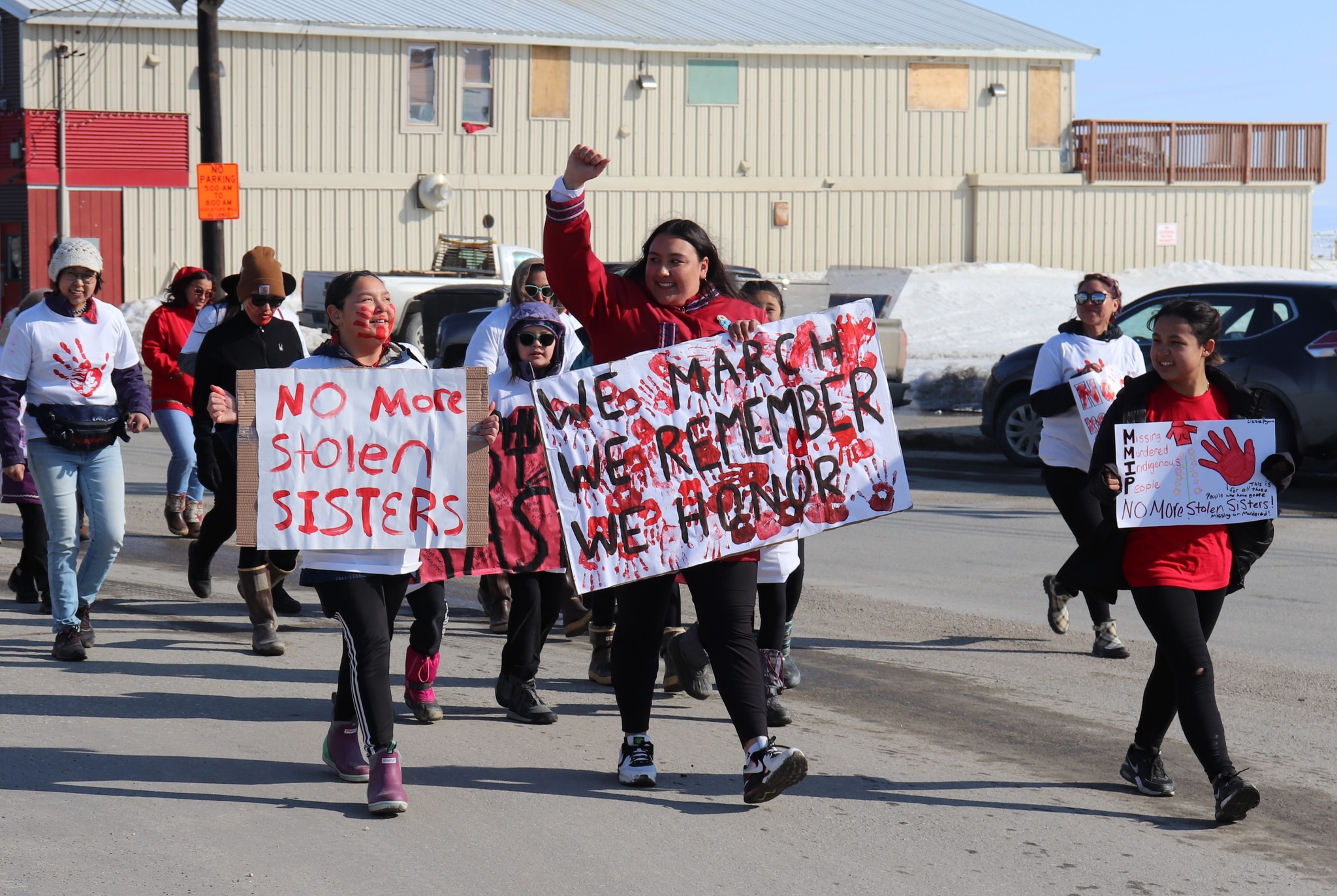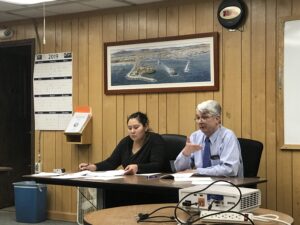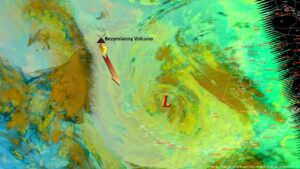The National Day of Awareness for Missing and Murdered Indigenous Women and Girls is held annually on May 5. In Nome, nearly 100 people observed the day with a peaceful march and a speaker’s event.
A walk to commemorate those who are loved and lost, as well as for survivors, family members and friends, was held downtown. The people who marched wore red face paint and red shirts and cried out for justice, saying “What do we want? Justice! When do we want it? Now!”
According to research by the Centers for Disease Control, homicide is the third leading cause of death among Native girls and women aged 10 to 24, and the fifth leading cause of death for Native women aged 25 to 34.
Similar research by the U.S. Department of Justice has shown four out of five Native women have experienced some form of violence in their lifetime.
During the speaking event at the Nome Rec Center, empty red dresses and red t-shirts were on the wall, reminding us of those who are are not with us.
Kirsten Timbers is president of the Village of Solomon. At the speaking event before the march, she told the audience about the mishandling of an investigation into her aunt’s death in Anchorage – and how her family was never the same after.
“I was nine years old, and my life was forever changed,” Timbers said. “The bullet of injustice from our legal system struck me right in the heart. Because her death is a systemic problem that’s rooted in oppression and traumas from discriminatory laws, we are all affected.”
Melanie Bahnke, the President and CEO of Kawerak, Inc., spoke to a resolution passed by the organization’s board in 2005 – one that would start the process of identifying and tracking the missing and murdered in rural Alaska.
“Our board passed a resolution asking for an investigation into the missing persons and the people who had died under suspicious circumstances,” Bahnke said. “We started soliciting names from family members so that we could have what I call an unofficial list of missing persons or unsolved deaths that we were aware of.”
Bahnke went on to list the names of people whose deaths or disappearances were suspicious. The list did not include cases that could have been hunting accidents or suicides.
Deilah Johnson is one of the main organizers of the event. She told the crowd when any person goes missing or is murdered, it affects the whole community.
“Each of us is affected whether or not they are related to us,” Johnson said. “If it’s not our best friend, if it’s not our sister or cousin, it can be our neighbor. It’s somebody that’s at our grocery store when we’re checking out, getting our eggs or getting our milk. We see those faces that shape our community and those are still our family.”
Meghan “Sig” Tapqaq is a staff attorney for Kawerak and a member of the Nome Common Council. She said she was pleased that state and federal governments are finally honoring Domestic Violence Protective Orders issued by Tribal courts.
“I’m really proud that we have at least four tribes in the region who have issued domestic violence protective orders,” Tapqaq said. “We’re very fortunate that under the reauthorization of the Violence Against Women Act tribal court protective orders are afforded full faith and credit by state and federal agencies. Those are enforced even internationally. So, when a tribe steps in and says, ‘Hey, we have someone who needs protection’ they can go to state or federal law enforcement.”
The issue has been gaining traction at the Alaska State Capitol. In March, the House Tribal Affairs Committee heard a presentation from members of the Missing and Murdered Indigenous Women, Girls, and Two-Spirit (MMIWG2S) Alaska Working Group.
The working group provides education and gathers and shares information on the issue of missing and murdered Indigenous People to assist lawmakers in discerning and addressing issues that affect many Alaskan families.
Dr. Charlene Aqpik Apok, the executive director and co-founder of Data for Indigenous Justice, testified before the committee about the deep impact of abuse, trafficking and violence experienced among families in the state.
“These are real people who are missing in our lives, they’re mothers, grandmothers, or auntie’s, or uncle’s or our neighbors, our friends and our relatives,” Apok said. “We keep finding that the more this issue is talked about, how many people understand that they’ve been impacted or that they’re like, ‘Oh, my neighbor says something about that.’ And so, this is happening across Alaska and with our families and to all Alaskans.”
Data for Indigenous Justice is the first Indigenous-led organization to collect missing and murdered data in Alaska and seeks to reclaim and consolidate MMIWG2S data that is largely incomplete while moving toward data sovereignty by putting the information in the hands of Indigenous communities.
During her visit to Nome on Friday, Lt. Gov. Dahlstrom said she advocates for keeping the memories of relatives and community members who were missing and murdered with us.
“It’s important that we keep reminding people that someone’s loved ones, you know, didn’t come home,” Dahlstrom said. “So, I’m pleased to be here for that.”
Retired Alaska State Trooper Lonny Piscoya, who was raised in Nome, returned last year to the Alaska Department of Public Safety to lead the department’s Missing or Murdered Indigenous Persons Initiative.
May 5 was designated as the day of awareness for Missing and Murdered Indigenous Women and Girls as it was the birthday of Hanna Harris, a member of the Northern Cheyenne Tribe who went missing and was murdered in 2013.
Image at top: A march was held in downtown Nome on May 5 to mark the remembrance of Missing and Murdered Indigenous Women & Girls. Photo by Greg Knight/KNOM





